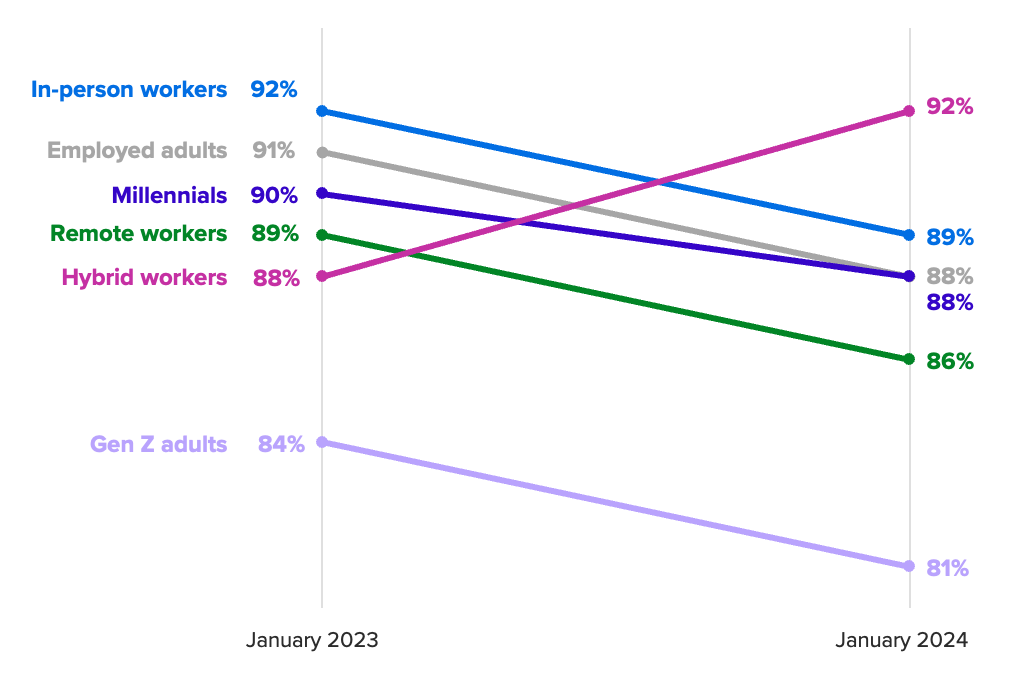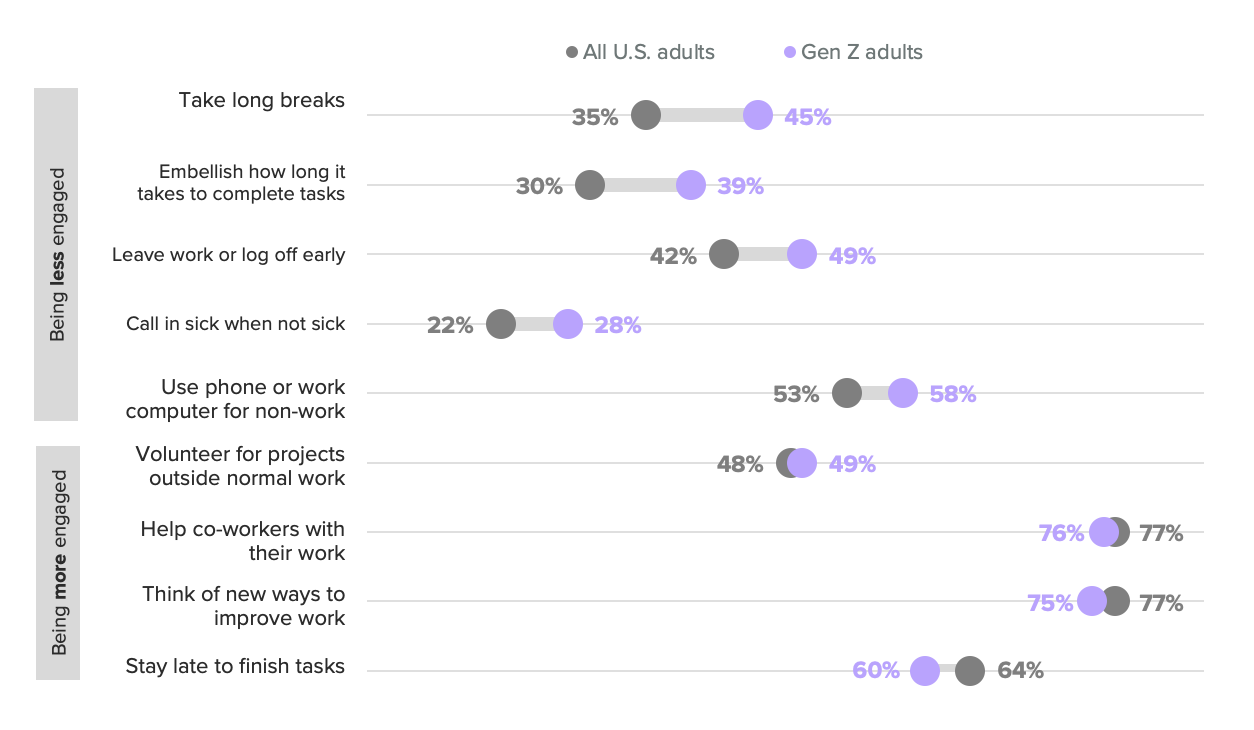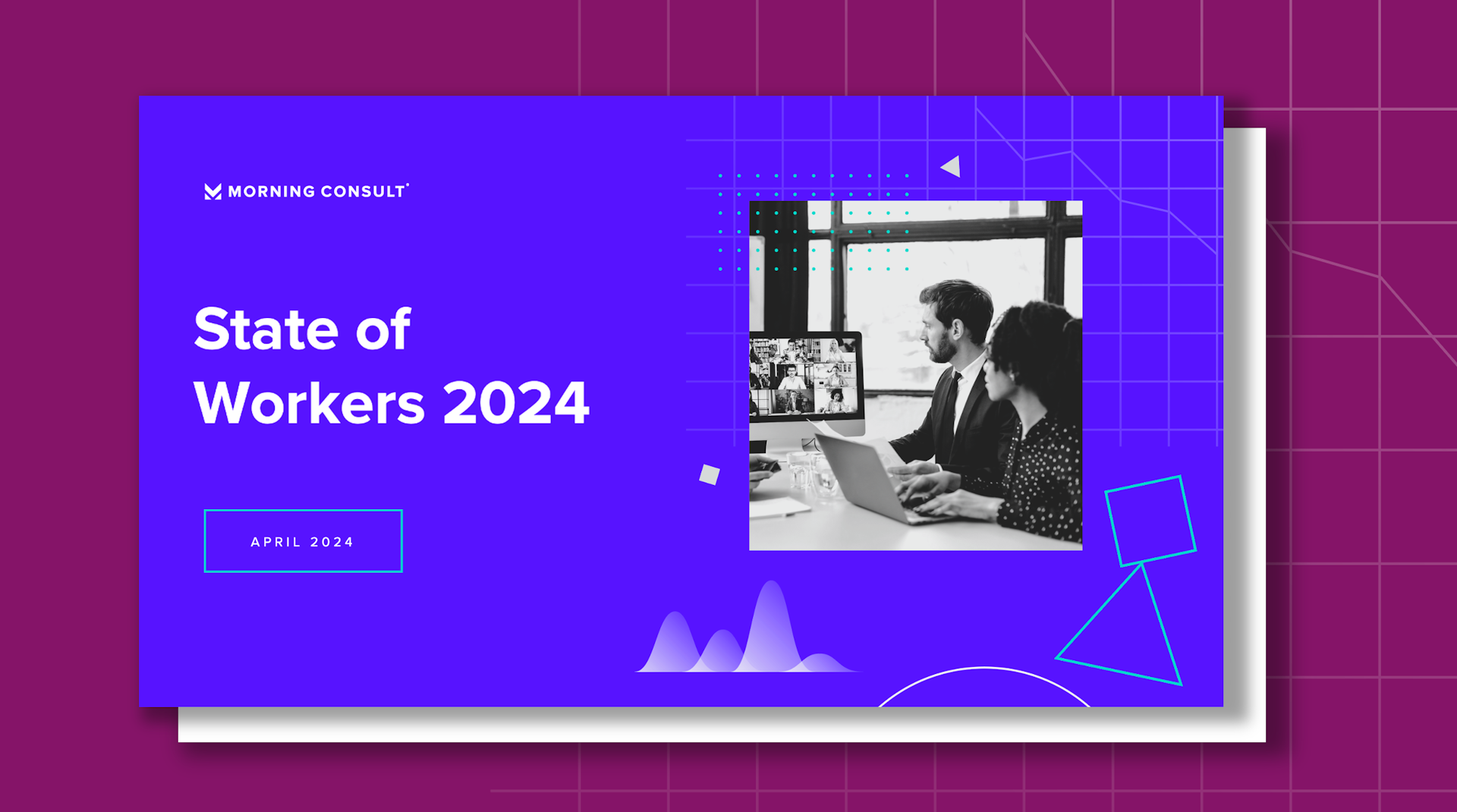Quiet Quitting Persists Among Gen Z Workers

Key Takeaways
36% of Gen Zers say they feel “very engaged” with their jobs, 13 percentage points lower than all U.S. workers.
Gen Zers are more likely than the average worker to say they engage in activities associated with quiet quitting, such as embellishing the amount of time it takes to complete tasks or logging off work early.
While quiet quitting may not be as central in work conversations this year, Gen Z is still driving the trend — likely due to a combination of where they are in their professional lives and because traditional work may not resonate the same way as it does for their older counterparts.
Data Downloads
Pro+ subscribers are able to download the datasets that underpin Morning Consult Pro's reports and analysis. Contact us to get access.
This features analysis from Morning Consult’s State of Workers 2024 report. For more insights on where employed adults are working, what their work preferences are, and how engaged they are with their jobs, download the full report here.
Last year, the concept of quiet quitting came to a crescendo when Gen Zers popularized the concept on social media and took it mainstream. And while quiet quitting may no longer be a trending social media topic, our latest State of Workers report shows Gen Z employees continue to say they partake in a number of activities associated with it. In some cases, the frequency of their participation grew, compared with last year, something that employers need to pay attention to in their efforts to retain and attract Gen Z talent.
Gen Z workers lag behind on engagement and are more likely to participate in quiet quitting activities
While workers in general are feeling less engaged than they were a year ago, Gen Z continues to lag behind. Young workers are 7 percentage points less likely than the average worker to say they feel engaged when working, and the gap between those who report feeling very engaged with work is even larger (13 points).
Gen Zers are less engaged with their jobs than the average worker

It stands to reason, then, that higher shares of Gen Z said they always, sometimes or often taking longer breaks, embellishing how long it takes to complete work tasks, logging off early, or calling in sick when they’re not sick.
Quiet quitting persists among Gen Z workers

Some of these quiet quitting behaviors can be attributed to where Gen Z is in their careers right now: The oldest Gen Zers have only been in the post-college workforce for a short bit of time relative to their predecessors, and younger workers within the cohort are newly getting acclimated to their work lives. Many are likely in jobs that don’t match their desired realities, which naturally leads to some disengagement. For example, when asked how well their current jobs fit their experience and skills, 42% of Gen Z workers said very well, compared to 49% of all workers who said the same. While this difference is noteworthy, it likely is not unique to Gen Z. Many other workers probably felt similarly at the start of their careers.
How social media is changing Gen Z’s relationship with work
However, what is unique to Gen Z is the role that social media plays, both in showing them examples of unconventional career paths, and serving as a destination to facilitate conversations around work itself.
The rapid changes in social media over the last few years — hello TikTok — means that there are more examples than ever of attractive alternatives to the traditional 9 to 5. A good chunk of Gen Z wants to become influencers (and would even pay to become one if they could), and the concept of a personal brand is incredibly salient for them. And neither are easy to cultivate through traditional jobs alone if one just entered the workforce.
And then on top of that, social media provides Gen Z ample grounds for pushing back on previously established American career norms and what it means to be a worker in general. While some of the disengagement we see is due to early jobs not aligning with career goals, other segments of the generation may remain disengaged with work beyond their 20s because they’re embroiled in a philosophical debate about whether work should take up this much importance in their lives at all.
The pandemic surfaced already existing tension in Americans’ relationship with work, and for a generation where everything is up for debate, Gen Z dove into this topic with much enthusiasm. Anti-work conversations anchored around buzzy hashtags — “soft life job,” “bare minimum Mondays,” “quittok” — indicate that they would rather work to live instead of living to work, and that they don’t buy the long-held belief that you can find a job you love and then never have to work another day in your life. Gen Zers already make up the biggest share of workers that view their professional lives as a quid pro quo, and discourse may compound this in the coming years as Gen Z grows even more seasoned in their careers.
This features analysis from Morning Consult’s State of Workers 2024 report. For more insights on where employed adults are working, what their work preferences are, and how engaged they are with their jobs, download the full report here.
Amy He leads Industry Analysis at Morning Consult. Prior to joining Morning Consult, Amy served as the executive editor at eMarketer, and was a China reporter for many years. She graduated from New York University with a bachelor’s degree in journalism and East Asian studies. For speaking opportunities and booking requests, please email [email protected].


